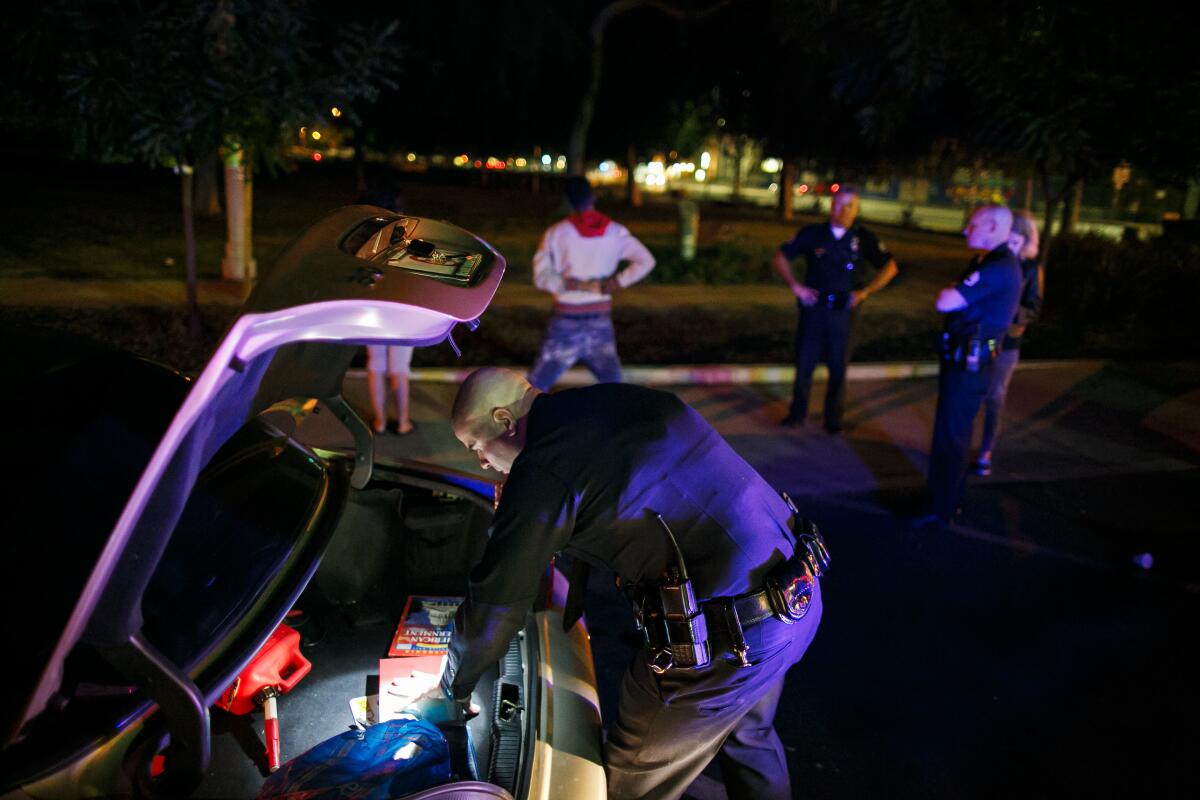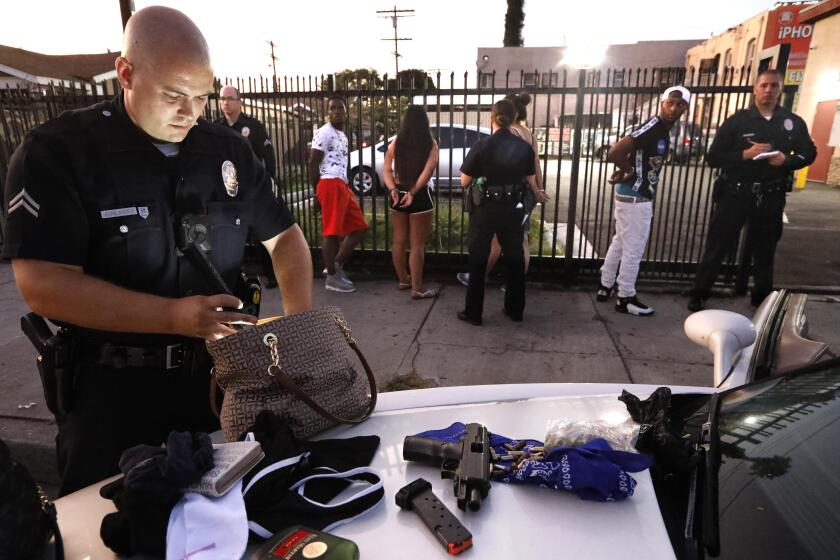LAPD considering new limits on ‘pretextual stops’; police union objects

- Share via
The Los Angeles Police Department is considering limiting “pretextual stops” of motorists and pedestrians by officers investigating serious crime, arguing they aren’t effective and have undermined public trust in the police — particularly among Black and Latino residents who have been disproportionately targeted in the past.
Such stops involve officers citing minor traffic or code violations as a “pretext” for stopping motorists, bicyclists or pedestrians who they suspect may be involved in more serious crime. They have been used by the LAPD for decades, especially in South L.A. and other areas where gun violence is high, but have come under increased scrutiny since a 2019 analysis by The Times found significant racial disparities in their use.
The proposed policy, which went before the civilian Police Commission on Tuesday over the objections of the union that represents rank-and-file officers, would bar such stops from being conducted “unless officers are acting upon articulable information” about a serious crime.
The policy states that such stops “should not be based on a mere hunch or on generalized characteristics such as a person’s race, gender, age, homeless circumstance, or presence in a high-crime location.”
The policy also states that the duration and scope of such stops must not be extended beyond what would be warranted to address the violation that served as the pretext for the stop without “articulable reasonable suspicion or probable cause of criminal activity,” and requires officers to record their reasons for all such stops on their body-worn cameras.
To combat a surge in violent crime, the Los Angeles Police Department doubled the size of its elite Metropolitan Division in 2015, creating special units to swarm crime hot spots.
The policy also acknowledges in a formal way the harm that such stops can cause.
“Conducting a vehicle or pedestrian stop and/or detention can promote public safety and the protection of the public from serious and sometimes violent crime,” the proposed policy states. “Such stops can also subject motorists and pedestrians to inconvenience, confusion, and anxiety, and strain relationships between law enforcement and the community. This is particularly true as community members sometimes perceive stops as biased, racially motivated, or unfair.”
In its 2019 analysis, The Times found that the LAPD’s Metropolitan Division — tasked with suppressing violent crime — stopped Black drivers at a rate more than five times their share of the city’s population, and that Black and Latino drivers were stopped more often despite being less likely to have contraband on them.
Spurred on by The Times’ findings, the LAPD scaled back its use of such stops dramatically. The department’s inspector general also audited the use of such stops, finding in 2020 that Black and Latino drivers were subjected to far more stops than white drivers despite being less likely to have contraband.
It also found the stops were “of limited effectiveness in identifying evidence of illegal firearms or other serious crimes,” with only 2% of traffic stops resulting in an arrest.
On Tuesday, Lizabeth Rhodes, the LAPD’s director of constitutional policing and policy, said the new policy balances public safety needs with the department’s need for community collaboration and trust and accountability, limiting such tactics without banning them entirely.
She said the new policy, if approved by the commission, would mark a significant and important shift in LAPD thinking around violent crime and the best ways to solve it. Rhodes said implementation of the new policy will require new training for officers, which is something she is working on.
Mark Smith, the department’s inspector general, said the proposed policy would help address many of the serious flaws identified in his office’s 2020 audit.
An L.A. Times analysis found a black person was more than four times as likely to be searched by police as a white person, and a Latino was three times as likely.
“This policy takes a giant step toward putting appropriate limits on the type of stops that we saw as potentially problematic,” Smith said.
He also said that “how it plays out in practice is of course what’s important,” and his office will be watching the rollout.
Larry Hanna, an attorney for the Los Angeles Police Protective League, took a different position — calling into the commission meeting to urge the commissioners not to approve the policy and to instead direct the department to go back to the negotiating table with the police union.
Rhodes’ office was in communication with the union about the policy as it was being drafted, but Hanna accused the department of operating in bad faith and ignoring the perspective of officers in devising the new policy.
“We’re very unhappy in the way we’ve been treated in this,” Hanna said.
Hanna did not specify the union’s specific problems with the policy during the commission meeting, and did not respond to a request for comment.
Commission President William Briggs said he took issue with Hanna’s characterization of the department’s discussions with the union prior to submitting the draft proposal to the commission, saying the department had operated in good faith.
Briggs said the union had objected in part to the language in the new policy acknowledging that pretextual stops had negative impacts in the community. But before he could elaborate, LAPD Chief Michel Moore requested that the discussions between the department and the union about the policy be kept private.
The commission did not adopt the new policy, instead opening it up to public comment for the next two weeks. Comments can be emailed to stops@lapd.online, and will be made public ahead of the commission taking the policy back up for a vote on March 1, commissioners said.
Also discussed by the commission on Tuesday was a new online dashboard being created by the department to highlight and make public an array of data that the department is required to collect under the state’s Racial and Identity Profiling Act.
Moore and other officials said their hope is that the dashboard and a new data analysis process being created — and set to be launched this year — will further improve the department’s understanding of how stops are being conducted and whether any disparities exist, such that it will be able to make continual improvements.
The role that police officers play in enforcing traffic laws in L.A. has been questioned for years, with some suggesting that officers should be removed from such enforcement entirely. However, efforts to assess alternatives have floundered.
As one example, the city transportation department still hasn’t produced a study on alternatives to armed officers handling traffic stops that the City Council ordered it to conduct nearly two years ago.
More to Read
Sign up for Essential California
The most important California stories and recommendations in your inbox every morning.
You may occasionally receive promotional content from the Los Angeles Times.















